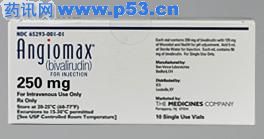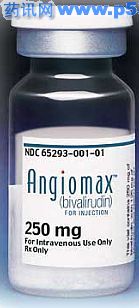|
比伐卢定注射剂 Bivalirudin Inj 【适应症】用于预防血管成型介入治疗不稳定性心绞痛前后的缺血性并发症 【剂型规格、用法用量】冻干粉剂---250mg/瓶。常规剂量为首剂1.0mg/kg,合并2.5mg/kg/h 静脉滴注4h,如果需要,可按0.2rng/kg/h一维持至20h。用5%葡萄糖或0.9%氯化钠注射液溶解后使用。本品不得用于肌内注射。 【比伐卢定ANGIOMAX 临床】比伐卢定(bivalirudin)是一种最近应用于临床的凝血酶抑制剂,早期的临床研究显示比伐卢定抗凝治疗效果确切,且出血事件的发生率较低,和传统的肝素抗凝治疗相比使用更为安全。比伐卢定可通过结合于催化剂位点和循环及凝血酶血块的阴离子输出位点而直接抑制凝血酶的作用。 比伐卢定(Bivalirudin,Angiomax)是人工合成的抗凝药物,其抗凝成分为水蛭素衍生物C端20个氨基酸残基的肽。最先由瑞士Biogen公司研发,后转让给剑桥医药公司(the Medicines Company,TMC),于1997年12月23日向FDA递交新药申请(New Drug Application,NDA),直到2000年12月15日才被批准作为抗凝药用于接受PTCA的不稳定型心绞痛患者。比伐卢定审批历时三年,曾一度陷入困境,TMC和FDA主要展开了三轮审评。 比伐卢定最早批准上市日期为2000年12月15日,为粉针剂,欧洲商品名:Angiox,美国商品名:Angiomax,作为抗凝血药,规格250mg;作为抗凝血药物应用于临床。 ANGIOMAX SDV 250MG 10 Angiomax® (bivalirudin) for injection Product OverviewAngiomax® (bivalirudin) is an anticoagulant currently approved in the US and other countries for use in patients undergoing coronary angioplasty procedures. Angiomax works by directly inhibiting thrombin, a key factor involved in the formation of blood clots, to help prevent clot formation during angioplasty. The Medicines Company believes Angiomax will become the leading replacement for heparin in critical cardiovascular care. Heparin, an indirect thrombin inhibitor, was discovered almost 100 years ago and is a commonly used anticoagulant to treat arterial thrombosis. Angiomax has the potential to become a broadly applied intravenous anticoagulant in the treatment of arterial thrombosis. Safety ConsiderationsANGIOMAX with provisional use of glycoprotein IIb/IIIa inhibitor is indicated for use as an anticoagulant in patients undergoing percutaneous coronary intervention (PCI), and in patients with or at risk for heparin-induced thrombocytopenia and thrombosis syndrome (HIT/HITTS) undergoing PCI. ANGIOMAX is intended for use with aspirin and has been studied only in patients receiving concomitant aspirin. ANGIOMAX is contraindicated in patients with active major bleeding or hypersensitivity to ANGIOMAX or its components. The most common ( |




